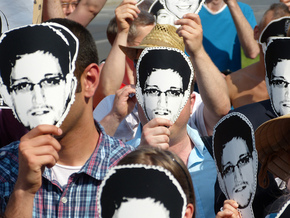
But not really, because there aren’t enough spy guys in the world to follow all the people who play Angry Birds, find directions on Google Maps or open a lot of other apps every day.
| | The usual sources — The New York Times, The Guardian and Pro Publica — reported Monday that “leaky” phone apps reveal a great deal of information that the spy agency keeps collecting. They also revealed that the app makers did not know about this and aren’t particularly happy. Their source, of course, is former NSA employee, now exiled in Russia, Edward Snowden. The news sites also revealed how massive the data is and how the spies seem at a loss as to what to do with it all. “Crunching just one month of N.S.A. cellphone data, a secret report said, required 120 computers and turned up 8,615,650 ‘actors’ — apparently callers of interest,” Pro Publica said. “A similar run using three months of British data came up with 24,760,289 actors.” If there is one thing Edward Snowden knows besides a lot of secrets about the NSA, it is how to keep a story going. And apparently he’s not even close to being done yet. Late last year former Guardian columnist Glenn Greenwald, who has been working with Snowden to reveal information, told ABC News we so far have “only a small fraction” of what’s eventually going to come out. The only thing missing in all this is context and perspective. And really, that’s what matters most. The U.S. government spies on people. We get it. The NSA is crafty, has a huge budget and knows how to build a comprehensive profile of just about anybody it sets its mind to study. We get that, too. So … why does the NSA do it? Could there be noble reasons, even if the methods aren’t the best? Snowden is turning into nothing but a more media savvy version of his buddy Julian Assange, who essentially papered the world with reams of stolen data that caused a little bit of embarrassment in diplomatic circles because it showed what American diplomats were secretly saying about their counterparts in allied nations. But nothing much else came of it. So it's time to ask Snowden what his point is. Does he want the United States to engage in a soul-searching session to see how the NSA fits under the Constitution? He’s done that. Does he want the president to scramble to find ways to reform the NSA so it can’t easily abuse the information it collects? He’s done that, too, although Barack Obama’s efforts were more show than substance. Does he think the NSA should stop the spying altogether? Or, put another way, does he care at all about the national security of the nation he fled? Edward Lucas has an answer to that. A writer for The Economist, he has written a book titled, “The Snowden Operation: Inside the West’s Greatest Intelligence Disaster.” In a recent piece for the Telegram, he said Snowden is a “useful idiot” at best, and that the things he has revealed help Russia more than any other country. Nations employ spies to keep themselves safe. There is nothing new or interesting about that. “For all the media hype in The Guardian, the BBC and elsewhere, Snowden’s published material does not prove systematic, sinister wrongdoing or abuse by the NSA or its British counter, GCHQ,” Lucas wrote. So it comes down to the same argument that has raged since Edward Snowden first became a household word. Is he a patriot or a traitor? Frankly, I’ve been back and forth on the question a bit. But now I think it’s time for Snowden himself to make a convincing case for himself as a patriot. What is the point of all this information? Where is the proof that the NSA has abused what it has gathered? Can he demonstrate how he knows his leaked information hasn’t helped terrorists and other enemies of the United States? Why should the Obama administration welcome him home rather than continue to hunt him down as a fugitive from justice? |

 RSS Feed
RSS Feed

